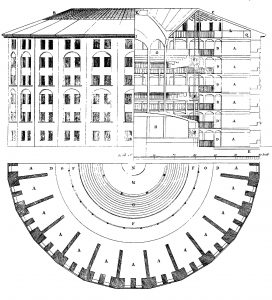
La Stanford Encyclopedia of Philosophy presenta així a Jeremy Bentham:
Jeremy Bentham, jurist and political reformer, is the philosopher whose name is most closely associated with the foundational era of the modern utilitarian tradition. Earlier moralists had enunciated several of the core ideas and characteristic terminology of utilitarian philosophy, most notably John Gay, Francis Hutcheson, David Hume, Claude-Adrien Helvétius and Cesare Beccaria, but it was Bentham who rendered the theory in its recognisably secular and systematic form and made it a critical tool of moral and legal philosophy and political and social improvement. In 1776, he first announced himself to the world as a proponent of utility as the guiding principle of conduct and law in A Fragment on Government. In An Introduction to the Principles of Morals and Legislation (printed 1780, published 1789), as a preliminary to developing a theory of penal law he detailed the basic elements of classical utilitarian theory. The penal code was to be the first in a collection of codes that would constitute the utilitarian pannomion, a complete body of law based on the utility principle, the development of which was to engage Bentham in a lifetime’s work and was to include civil, procedural, and constitutional law. As a by-product, and in the interstices between the sub-codes of this vast legislative edifice, Bentham’s writings ranged across ethics, ontology, logic, political economy, judicial administration, poor law, prison reform, international law, education, religious beliefs and institutions, democratic theory, government, and administration. In all these areas he made major contributions that continue to feature in discussions of utilitarianism, notably its moral, legal, economic and political forms. Upon this rests Bentham’s reputation as one of the great thinkers in modern philosophy.
Títols disponibles de Jeremy Bentham:
- Bentham, Jeremy, Antología. ed. de Josep M. Colomer ; traducciones de Gonzalo Hernández Ortega y Montserrat Vancells. Barcelona : Península, 1991.
- Bentham, Jeremy, Tácticas parlamentarias. Madrid : Congreso de los Diputados. Dirección de Estudios y Documentación, 1991.
- Bentham, Jeremy, Tratados de legislación civil y penal; ed. Magdalena Rodríguez Gil. Madrid : Editora Nacional, 1981.
Una de les contribucions de Bentham a la història del pensament és el desenvolupament del Panòptic: construcció carcerària, arquitectònicament funcional, que permet la visió de tots els presos per una sola persona des d’un únic lloc, una versió moderna de l‘Ull de Deu a la que Michel Foucault dedicarà moltes pàgines.

Qüestió a debat
- Es pot construir el Panòptic o és pura especulació de Bentham?
